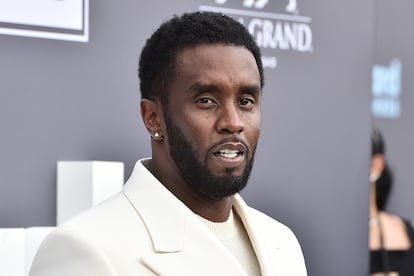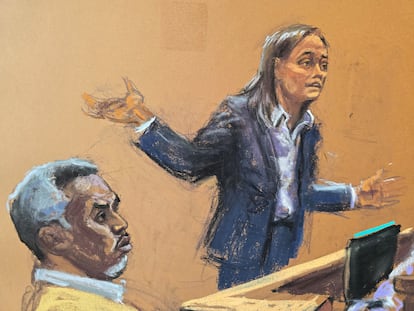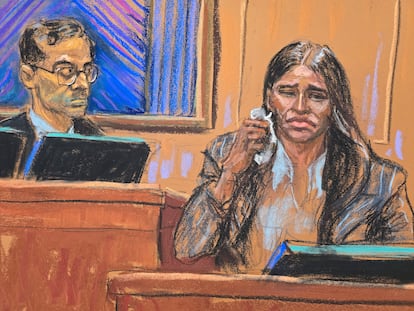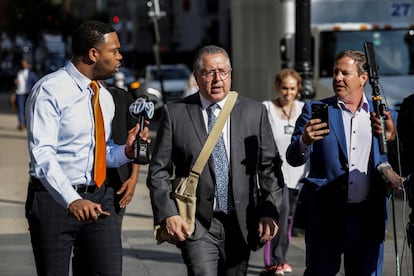Sean Combs’ trial enters its final stretch: Jury deliberates on whether he led a criminal network to abuse women
Prosecutors allege that the rapper, also known as Puff Daddy, orchestrated an illegal scheme involving multiple victims, while his lawyers claim the acts were private and consensual


It’s almost over. After a month and a half during which both the jury and the entire world have heard the testimonies of dozens of witnesses against Sean Combs — the musician also known as Puff Daddy or Diddy — who has been tried for various crimes including sex trafficking, racketeering, and transportation for prostitution, the trial comes to an end this Monday in New York.
What comes next is the really difficult part: deliberation by the 12 jury members — eight men and four women — which could take anywhere from a couple of days to weeks. They will convey their decision on the guilt (or, who knows, the innocence) of the music mogul to Judge Arun Subramanian. If they find him guilty of one or more of these crimes, as everything suggests, it will be Subramanian who imposes the sentence, which could be several decades in prison.
Closing arguments from both the prosecution and Combs’s defense ended on Friday, but Judge Subramanian has given himself until this Monday to convene the courtroom one last time and instruct the jury, as well as to select the jury foreperson (who will be juror number 5). He preferred that they return “fresh on Monday morning,” he explained on Friday, so they could spend the weekend reflecting on everything heard in the Daniel Patrick Moynihan courtroom. “Do not speak with each other about the case. Do not speak with anyone else about the case. Do not read or research or look up anything about the case,” he urged the jury on Friday, after the final arguments from both sides, of course, were completely opposed.
For the prosecution, the case is crystal clear: Sean Combs, arrested in New York in September 2024, is, for them, a criminal who has been pulling the strings of an extremely complex network for about two decades. They believe they have more than proven the two counts of sex trafficking, the two counts of transportation to engage in prostitution, and one count of racketeering conspiracy, the most serious one.
For Combs to be convicted of racketeering, the jury will have to decide that he conspired with at least one other person in that network to commit at least two crimes (kidnapping, arson, sex trafficking, possession and distribution of substances, forced labor, etc.) within a period of less than 10 years. According to the prosecution, that happened without any doubt, and the racketeering charge is supported by his activities between 2004 and 2024.
In her closing arguments on Friday, prosecutor Maurene Comey was tough and direct. With that dramatic tone typical of U.S. lawyers, and knowing she was being heard by thousands, she began by saying: “For 20 years, the defendant got away with his crimes. That ends in this courtroom.”
Comey — a renowned attorney who worked for the prosecution in 2021 on the Ghislaine Maxwell case (Jeffrey Epstein’s partner) and daughter of former FBI Director James Comey — has been one of the stars of this high-profile case. Combs, she said, is “not a god. He is a person. And in this courtroom, he stands equal before the law. Overwhelming evidence proves his guilt. It is time to hold him accountable. Find him guilty.”

The case is based on two formal complaints, although there are around 150 against Combs in total. First, that of Casandra Ventura — known as Cassie, a singer and one of Combs’s longest-term partners, from the mid-2000s to 2018 — who blew the whistle on him by becoming the first to file a complaint in November 2023. Her testimony during the first week of the trial was explosive.
Then came the complaint from an anonymous woman referred to as Jane, who described a similar pattern of abuse that reinforced Ventura’s account — including forced sex, beatings, threats, and humiliation at the hands of Combs — but in more recent years. For the prosecution, the testimony of both women has been the final nail in Combs’s coffin, who has not taken the stand in his own defense.
Prosecutors argue that although both women had consensual relationships with the defendant, they were also coerced into many non-consensual acts, from which they felt unable to escape due to the fear Combs and his organized circle instilled in them. They were subject to constant threats — against themselves or their loved ones, and against their physical or financial freedom.
According to the prosecution, the testimony of Ventura, Jane, and many others who took the stand demonstrates that Combs led a network with aides and associates who knew his modus operandi and committed crimes on his behalf — including, for example, bribes to purchase the now-infamous 2016 video that shows Combs dragging Ventura down a hotel hallway.

“If there is one time — one single freak-off that jurors find were the product of force, threats of force, fraud or coercion, Mr. Combs should be found guilty of sex trafficking,” a prosecutor argued, referring to the orgies the musician allegedly organized.
According to witnesses, these events often involved his romantic partners and other individuals — usually men — whom he paid. The “freak-offs” could last for days, during which, as Ventura testified, the women would take drugs in an attempt to numb themselves from the coercive sexual acts. Combs would record the encounters and later threaten to leak the footage if they didn’t comply with his demands.
According to the prosecution and its witnesses, Combs relied on staff who helped coordinate the operation across homes, yachts, and hotels, along with witnesses who have sought to corroborate those accounts.
The defense, by contrast, maintains that the encounters were consensual — unusual and extreme, perhaps, but voluntary. This remains their central argument, despite victims repeatedly stating they participated under duress, fearing threats and blackmail.
Combs’s lead attorney, Marc Agnifilo, delivered the defense while the musician sat silently at the bench each day, often flanked by several of his seven children and his mother. (His teenage twin daughters were notably absent during Cassie’s most graphic testimony.) For the defense, this family presence served a symbolic purpose: “He sits there innocent. Return him to his family who have been waiting for him,” said Agnifilo.

Agnifilo — speaking loudly, at times shouting, gesticulating wildly, and using clichés and jokes — described the trial on Friday as “a tale of two trials.” One of them, according to his version, was based on evidence: messages, videos, documents, and witness testimony. The other, he said, was “a badly exaggerated” story told by the prosecution, centered on sex trafficking and organized crime.
To him, none of that holds water: Combs is a liberal man, a celebrity with a lavish lifestyle — yes, with drug addictions and certain issues of violence in past relationships, Agnifilo conceded — but by no means the head of a violent criminal organization. Rather, these were private, consensual acts between partners. “He did what he did. But he’s going to fight to the death to defend himself against what he didn’t do,” Agnifilo said of his client. “You want to call it swingers, you want to call it threesomes. Whatever you want to call it, that is what it is — that’s what the evidence shows.”
Now, the ball is in the jury’s court. On Monday, the judge gave them a detailed explanation of the charges and instructions on how to proceed — including that they’re allowed to deliberate past 5 p.m., the usual end time for trial sessions. “The case was really exceptionally tried by both sides,” he remarked, thanking the prosecution and defense for their cooperation.
But deliberations got off to a rocky start: the jury sent a note to the judge expressing concern that one of its members — juror number 25 (of the original 45 selected; one was dismissed midway through the trial) — “cannot follow your honor’s instructions.” The juror in question is a 45-year-old white male scientist from Manhattan. For now, the judge instructed them to continue: “I received your note. I remind every juror of their duty to deliberate and their obligation to follow my instruction on the law. With that instruction in mind, please continue deliberating.” That said, five alternate jurors remain. There are still chapters left to be written in Sean Combs’ story.
Sign up for our weekly newsletter to get more English-language news coverage from EL PAÍS USA Edition
Tu suscripción se está usando en otro dispositivo
¿Quieres añadir otro usuario a tu suscripción?
Si continúas leyendo en este dispositivo, no se podrá leer en el otro.
FlechaTu suscripción se está usando en otro dispositivo y solo puedes acceder a EL PAÍS desde un dispositivo a la vez.
Si quieres compartir tu cuenta, cambia tu suscripción a la modalidad Premium, así podrás añadir otro usuario. Cada uno accederá con su propia cuenta de email, lo que os permitirá personalizar vuestra experiencia en EL PAÍS.
¿Tienes una suscripción de empresa? Accede aquí para contratar más cuentas.
En el caso de no saber quién está usando tu cuenta, te recomendamos cambiar tu contraseña aquí.
Si decides continuar compartiendo tu cuenta, este mensaje se mostrará en tu dispositivo y en el de la otra persona que está usando tu cuenta de forma indefinida, afectando a tu experiencia de lectura. Puedes consultar aquí los términos y condiciones de la suscripción digital.








































